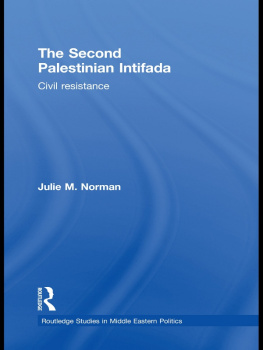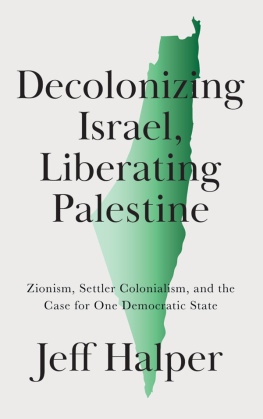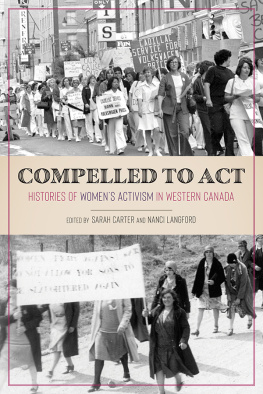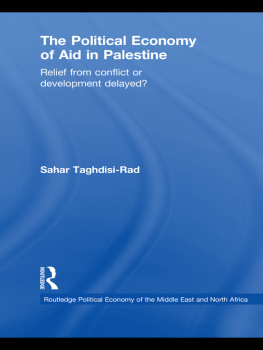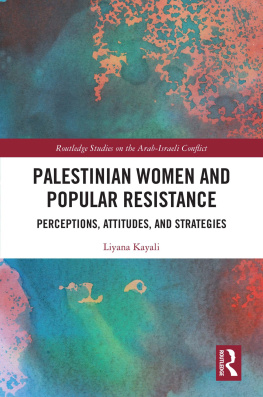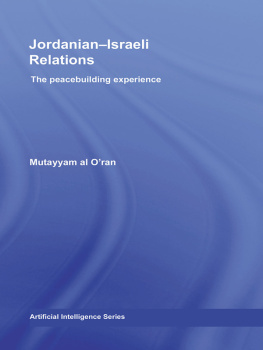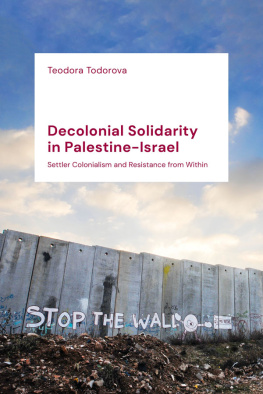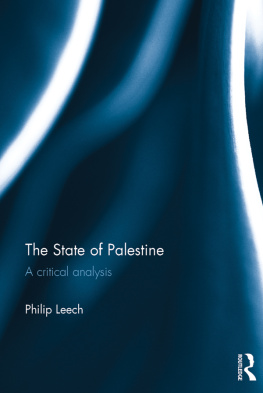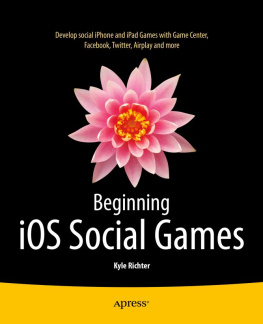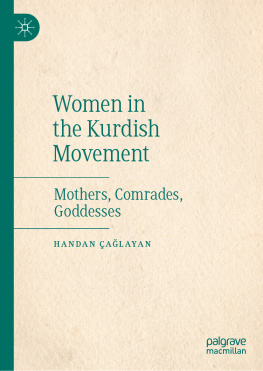2018 by the Board of Trustees
of the University of Illinois
All rights reserved
Library of Congress Cataloging-in-Publication Data
Names: Richter-Devroe, Sophie, author.
Title: Womens political activism in Palestine : peacebuilding, resistance, and survival / Sophie Richter-Devroe.
Description: Urbana : University of Illinois Press, [2018] | Series: National Womens Studies Association / University of Illinois first book prize | Includes bibliographical references and index.
Identifiers: LCCN 2018008577| ISBN 9780252041860 (hardcover : alk. paper) | ISBN 9780252083525 (pbk. : alk. paper)
Subjects: LCSH: Women, Palestinian ArabPolitical activity. | Women, Palestinian ArabSocial conditions. | PalestineSocial conditions.
Classification: LCC HQ1728.5.R53 2018 | DDC 320.082/095694dc23
LC record available at https://lccn.loc.gov/2018008577
ISBN 9780252050558 (e-book)
Cover illustration: A Palestinian woman and her
child walk past a large painting declaring Palestinian
revolution on the controversial Israeli separation barrier
in Bethlehem, West Bank, 2012. (UPI/Debbie Hill)
To my mother
Acknowledgments
Many people accompanied the researching and writing of this booka work that I started around a decade ago when I came to the United Kingdom to do my doctorate. Since then the manuscript has changed a lot as it traveled with me to various places, and people all over the world have read drafts, helped, and given their advice.
First and foremost, I want to thank the many Palestinian women and men who supported me throughout my fieldwork and were also there to answer questions and give clarifications during the long period of writing that followed. They offered me their trust and never got tired of explaining and discussing the different aspects of womens politics in Palestine. Many of my research participants became friends, and I have been lucky to see them regularly during my visits to Palestine over the years. I prefer not to mention names here, as I have chosen to anonymize all my research participants, but I am certain those of you who read this know that my thanks are addressed to you. Without you, this book could not have come to be.
My doctoral supervisors, Gerd Nonneman and Ruba Salih, were crucial not only in setting the early frameworks for the research, but following it through to the completion of my doctorate at Exeter University in 2010. I am grateful for their invaluable and generous support, for their careful readings of earlier drafts, and for the many long discussions we have had on the book and other topics. I feel privileged to have had the chance to continue working with them also after I received my doctorate, and that we are friends.
Many other colleagues have offered comments and advice on the book or influenced my thinking on the topic through our discussions. I thank Rosemary Sayigh, who is an important inspiration for me; Lila Abu-Lughod, who offered very crucial and valuable advice on another research project, but her comments there also influenced my rewriting of this book; Ilan Papp, who continued to offer advice and guidance on my work after having been examiner for my thesis; Nicola Pratt, with whom I had the great chance to work together on topics related to this book; and Nadje al-Ali, who examined my dissertation and made important comments and suggestions for change; as well as Dana Olwan, Veronica Buffon, and Annie Pfingst, who provided very important last-minute advice, helping me finalize the manuscript. I am grateful to have had the support of such a supportive community of scholars and friends. Their feedback has been immensely helpful.
At the University of Illinois Press, I was fortunate to work with two talented editors, Larin McLaughlin and Dawn Durante, both of whom assisted me through the period of revising and finalizing the manuscript. I also would like to express my thanks to the two anonymous reviewers who provided important comments and remarks. I am grateful to Laura Helper-Ferris and Deborah Oliver, who helped me during the final round of revisions, rewriting and editing, and I also thank my students, Peeter Raudsik and Abdulrahman Abohajeb, who contributed careful editing work.
My doctoral research, from which this book developed, was funded by a Ph.D. Studentship from Exeter Universitys Institute of Arab and Islamic Studies. I am grateful for this financial support.
The core argument of ). I thank the publishers for granting me permission to republish.
Throughout the various stages of writing the book, friends in different placesBerlin, Temmen, Exeter, London, Athens, Salamina, Dohahave helped me to get through. I often think back of the fun times with my doctoral colleagues back in Exeter, or the SOAS library, when we were all struggling to finish our dissertations. I feel so lucky to have good childhood friends from Berlin who have helped me many times to forget about work and to think things through from another angle. In Athens I cherish my para and our chats at Meliartos, Fougaro, or the sunset at Kanakia. Finally, Doha was, in its own strange way, a lucky turn in my life, as moving there allowed me to meet great new colleagues who also became friends.
My final thanks are to my family. I thank my dad for cheering me up as only he can, and my brothers for always keeping a critical but loving look on what their sister is up to. I thank my mum for always being there for me, for always being genuinely interested in what I do and write, for taking the time to read through all my work even though it is in English, and for always being ready to suggest yet another book that I could read. I thank Rodhoula for giving me a wonderful home in Athens. And my biggest thanks is to Yiannis for reading carefully everything I write, for challenging me to think differently, for his patience, andmost importantlyfor filling my life with happiness and love.
Note on Transliteration and List of Arabic Terms
I use the International Journal of Middle East Studies (IJMES) transliteration system for Arabic in this book, except for names of people (e.g., Ilham) and places (e.g., Ramallah) or other idioms (e.g., Nakba, Intifada) known in the English language. The IJMES system is commonly used for written texts, while ethnographic work, like mine, tends to rely on transliteration systems that try to reflect the spoken Arabic of interviewees. I decided to adopt the IJMES system nevertheless, based on two considerations. First, I do not cite extensively in transliteration from my interviewees, but rely on Arabic terms (in transliteration) only where I find an engagement with the different meanings of a specific term important. In these cases, the discussion revolves around the meanings and usages of a concept, whether written or spoken, rather than phonetics. Second, the Arabic dialect spoken by my interviewees varied widely depending on generation, rural or urban background, and their local residence in Palestine. It would have been difficult to establish a uniform transliteration system for these different dialects. I provide a list of Arabic terms used in the text, and translations, below.


